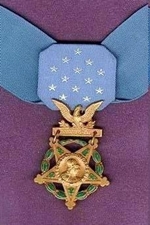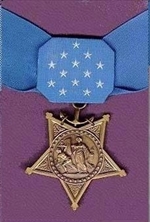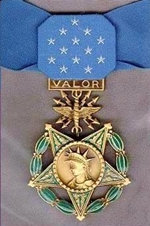 Rank and organization: Private First Class, U.S. Army, Company E, 9th Infantry Regiment, 2d Infantry Division.
Rank and organization: Private First Class, U.S. Army, Company E, 9th Infantry Regiment, 2d Infantry Division.
Place and date: Near Yongsan, Korea, 1 September 1950. Entered service at: Livingston, Ky. Born: 10 November 1926, Livingston, Ky. G.O. No.: 78, 21 August 1952. Citation: Pfc. Smith, distinguished himself by conspicuous gallantry and outstanding courage above and beyond the call of duty in action. Pfc. Smith was a gunner in the mortar section of Company E, emplaced in rugged mountainous terrain and under attack by a numerically superior hostile force. Bitter fighting ensued and the enemy overran forward elements, infiltrated the perimeter, and rendered friendly positions untenable. The mortar section was ordered to withdraw, but the enemy had encircled and closed in on the position. Observing a grenade lobbed at his emplacement, Pfc. Smith shouted a warning to his comrades and, fully aware of the odds against him, flung himself upon it and smothered the explosion with his body. Although mortally wounded in this display of valor, his intrepid act saved 5 men from death or serious injury. Pfc. Smith’s inspirational conduct and supreme sacrifice reflect lasting glory on himself and are in keeping with the noble traditions of the infantry of the U.S. Army.

